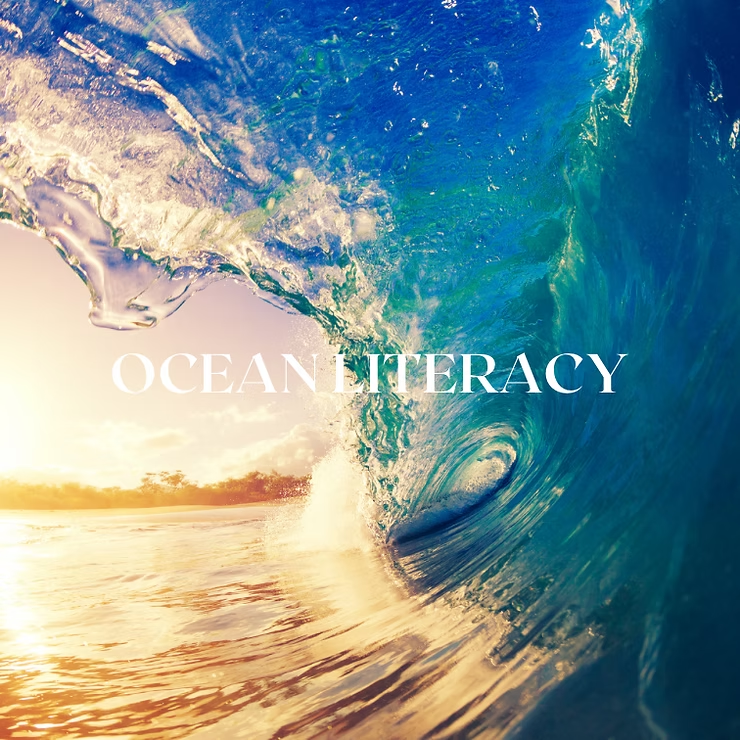Overview
Ocean literacy is the understanding of the ocean and its connection to life on Earth. It goes beyond basic knowledge and involves recognizing the ocean’s role in planetary health and the effects of human actions on marine ecosystems. Developing ocean literacy allows us to appreciate the ocean’s beauty and complexity while empowering us to take meaningful steps to protect it.
Why Ocean Literacy Matters
Ocean literacy is essential for informed decision-making and sustainable living. It equips individuals with the knowledge to recognize how daily choices impact the ocean and its ecosystems. By reducing plastic waste, supporting sustainable fishing, or advocating for protective policies, ocean literacy ensures that we can take effective action. Understanding the ocean’s influence helps us appreciate its role in regulating climate, providing food, and supporting biodiversity.
How Ocean Literacy Helps Save the Ocean
Increasing our understanding of the ocean strengthens our ability to protect it. With greater knowledge, individuals and communities are more likely to reduce pollution, support sustainable resource use, and address climate change. Ocean literacy also fosters responsibility, inspiring cooperation among people, organizations, and policymakers. Ultimately, it empowers society to safeguard marine ecosystems and build a sustainable future for generations to come.
The Impact of Human Activities on the Ocean
Pollution: A Silent Killer
Pollution from plastics, chemicals, and oil spills harms marine life and disrupts ecosystems. These contaminants also threaten human health, as they enter food chains and water supplies. Reducing pollution is essential to protect biodiversity and ensure healthy oceans.
Overfishing: Depleting Marine Resources
Unsustainable fishing practices are causing fish populations to decline and destabilizing marine food webs. Overfishing can lead to ecosystem collapse and reduced resources for future generations. Adopting sustainable practices is vital to restore balance and maintain ocean abundance.
Climate Change: A Threat to Marine Ecosystems
Climate change impacts oceans through rising temperatures, acidification, and sea level rise. Coral bleaching, shellfish decline, and coastal erosion are some of the damaging consequences. Reducing greenhouse gas emissions is necessary to protect both marine life and coastal communities.
Promoting Ocean Literacy
Education: Empowering the Next Generation
Education inspires young people to become ocean stewards. Through interactive lessons, field trips, and hands-on activities, students can gain a deep understanding of the ocean’s importance and the urgent need to protect it.
Community Engagement: Taking Action Together
Communities play a key role in ocean conservation. Beach clean-ups, volunteer programs, and awareness campaigns help raise understanding and encourage collective action. Working together creates a ripple effect that strengthens long-term ocean health.
Policy Changes: Protecting the Ocean
Strong policies are essential to limit pollution, regulate fishing, and address climate change. Governments can support marine protected areas, encourage sustainable practices, and enforce environmental standards. Policy-driven action ensures large-scale and lasting protection for marine ecosystems.
Conclusion
The Urgency of Ocean Literacy
The ocean’s health is directly tied to human survival. Without deeper understanding, society is unprepared to address challenges like pollution, overfishing, and climate change. Promoting ocean literacy equips us to respond effectively and protect our planet.
Taking Responsibility for the Ocean
Every individual shares responsibility for protecting the ocean. By reducing single-use plastics, supporting sustainable fishing, and advocating for environmental policies, we can collectively reduce harm. Real change starts with daily choices and shared commitment.
A Call to Action: Saving the Ocean Starts with You
- Reduce single-use plastics and choose reusable products
- Support businesses that prioritize sustainable practices
- Advocate for stronger environmental policies
- Participate in community initiatives like clean-ups
Small actions, when multiplied, create significant impact. Organizations such as Save Our Blue Ocean raise awareness and fund conservation through creative initiatives like ocean-themed bracelets. By supporting such efforts, we can all contribute to preserving our oceans and ensuring a healthier planet for the future.

